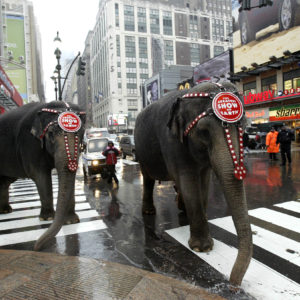When the Ringling Bros. circus was founded, Ulysses S. Grant was president and the South was in the middle of Reconstruction. The storied act will sadly come to an end in May. Ringling, after years of harassment from animal rights activists, announced it can’t keep the show running.
The blow to family activities doesn’t stop there. Activists are already plotting to make zoos history as well.
Ringling’s demise can be traced to its decision two years ago to stop having elephants in its shows. This move, which came after years of protests, litigation and lobbying campaigns from animal rights activists, caused a reduction in ticket sales since the main, four-ton attractions were gone. The show could not go on.
Circus protests, however, were never about the circus. They were about the fact that animals are kept in captivity. Animal activists are now turning their sights toward zoos. Their multi-faceted attack is starting with litigation.
Animal rights groups have threatened lawsuits against small facilities under the Endangered Species Act, which forbids “harming” endangered species. Their theory is that it’s a form of psychological “harm” to have animals in a pen. Other recent lawsuits have tried to free chimpanzees under habeas corpus, a tactic used by anti-slavery activists centuries ago.
Of course, you could give a tiger the equivalent of a five-star resort with a personal masseuse and an endless supply of gazelle tenderloin, and animal rights activists would still claim it’s cruelty. PETA refers to zoos as “prisons.”
They tried a similar tactic against Ringling Bros. and Barnum & Bailey, filing a lawsuit under the Endangered Species Act claiming that the use of an elephant-handling tool was abusive. They lost, and were countersued by Ringling’s owner, eventually settling for $25 million. (Most of that settlement was covered by the American Society for the Prevention of Cruelty to Animals and the Humane Society of the United States.) But that hasn’t deterred their legal efforts.
Zoos are popular. According to recent polling, 89 percent of the public agrees that zoos and aquariums help increase appreciation for animals, and 93 percent believe these institutions are a valuable resource for seeing rare animals in a more personal way than on TV. Three-quarters believe that conditions at zoos and aquariums are better than they were five or 10 years ago.
Unfortunately for society, the court system doesn’t rely on public opinion. A handful of judges could create a real mess for the future of zoos and aquariums.
It’s hard to overstate the effect this would have on animals. Zoos participate in species survival plans, wide-ranging projects to ensure genetic diversity of animals in zoos and support research, education and reintroduction efforts for these animals.
Animal rights activism also has a human cost. Thousands of jobs are tied to zoos and aquariums, from caretakers to wildlife biologists. Some zoos and aquariums are also big draws to downtown areas and vital cogs in a local economy. The Association of Zoos and Aquariums calculates that these facilities contribute $17.4 billion to the economy.
Ringling may have to lay off 400 employees who worked on the circus. Ironically, the “humane” activists haven’t uttered a peep about any of these people and the effect on their families.
How can we save zoos from lawyers? One, if you give to animal charities make sure you’re not accidentally funding a radical group.
Two, Congress needs to reform certain provisions of the Endangered Species Act. Congress could clarify that it’s not illegal for animals to be kept in ways that are generally accepted by veterinarians. Or it could reform the private right to sue that exists under the law.
Zoos and aquariums have spent decades and millions of dollars to rehabilitate animal populations and educate the public about conservation. If we don’t take ideological activists seriously, it could be the zoos that go extinct.


